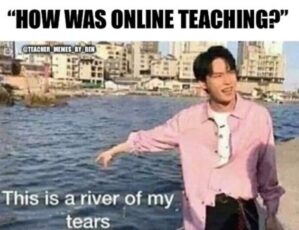Learning to Embrace Change


High school business and finance teacher Megan DeLena has worked with the Wharton Global Youth Program for more than 10 years, teaching in our summer high school program, serving on our Educator Advisory Board, and using our classroom resources with her own students, both in Pennsylvania and later in South Carolina.
In a fitting blog post for the end of a long and arduous teaching year, Megan offers other teachers her perspective on the power of change as not just a classroom disruptor, but also an opportunity for improvement.
I don’t know about you, but as a teacher, my Facebook feed is full of funny teacher memes. Some offer support or inspiration. Others encourage us to just hang in there, and some make it okay not to be okay. I get it all. I get blogs on how the system is broken; I get blogs that this year is harder than all the others. Even harder than 2020.
 But why is that, and is it really? I have been pondering this lately.
But why is that, and is it really? I have been pondering this lately.
Let me first say that I love to teach personal finance. Of all the business courses I have taught over 22 years, (and there have been a lot!) this is by far my favorite. I know that what I’m teaching will make a difference in my students’ lives every single day, starting today.
For all of that, I never said it was easy. We can all agree that it is most definitely not easy to teach these days.
My question is this: was it ever easy?
I was recently reading a blog I wrote 10 years ago for high school teachers involved with the global youth program at Wharton titled, “Teaching, and Adapting to, the Millennial Generation.” In it, I discussed how teachers and employers were claiming that kids had changed. They were somehow different these days. I disagreed. The world was changing — technology and social media were emerging forces that had begun to completely rewrite the rules – but the kids were still just kids, same as they’ve always been. So, 10 years ago, I encouraged teachers to change with the times.
My experiences in the decade since have only strengthened my belief in this point of view. I have taught in Pennsylvania, South Carolina, and for several summers at the Wharton Global Youth on-campus summer sessions. I have worked with high schoolers from all corners of the world. Trust me when I say it’s not the kids that are different.
“I choose to laugh more often than not, because losing my mind never helped my classroom management.” – Megan DeLena, High School Business Teacher
Fast forward to 2021. Teachers are pulled and stretched and overworked and overwhelmed. It has been a long semester. I am not here to blame the pandemic (although it has added its share of weight to the problem), and I am not here to blame the fact that teachers are grossly underpaid. These factors are certainly of critical importance, but much has already been written about both. The challenges that I do want to discuss here are deeper, farther-reaching, and will be with us forever.
In the last decade, social media conquered the world. No longer just Facebook, but Instagram, Twitter, Tik Tok, YouTube, LinkedIn, and a million other platforms competing for young people’s attention. It seems like there’s a new one practically every week. The pace of change is astounding, and this is the environment in which Gen Z has grown up.
To me, that’s the key difference.
For 22 years I have had unmotivated students; students who are perfectly satisfied with a barely passing grade; students who already have enough credits to graduate and so can’t be bothered to care anymore; students whose home lives are so turbulent that my class is not even on their radar. I could go on. None of this is new.
What is new, though, is the pace at which change now enters our lives.
It comes marching into our classrooms and never lets up, often like an unannounced observation (a TikTok Challenge to rip apart bathrooms, you say?). We thought 10 years ago that cell phones and fidget spinners would be the death of us. But if the addiction and reliance on phones was bad a decade ago when apps barely existed, today it is an epidemic.
I recently gave a student a hard time in accounting class because he had no idea how many days were in the month of August. He just looked at me and said, “Why do I need to know that? I’ll just look it up if I need it.” I was dumbstruck.

I also remember when I realized students could now text each other during tests from their watches, and that they could buy hoodies with special pockets for their e-cigs so they didn’t have to go to the bathroom. Yes, they can just vape during class. It’s exhausting.
So, what to do?
I am not here with all the answers, but as a business teacher I do know this: if we can frame the problem, we can deal with the problem.
First, don’t take all these distractions and competing platforms personally. It’s not you. Similarly, it’s not going to destroy your student-teacher dynamic to constantly remind students why they are in school. My colleague in the classroom next to me catches more vapes, cell phone violations, and students “sharing answers” than anyone else I know, and she has more students who adore her than almost any other teacher I’ve worked alongside.
Second, hang onto your sense of humor. It’s never been more critical. I will admit that a friend recently asked me how teaching in South Carolina was going and I said, “You know, sometimes they make me laugh and other days it’s all I can do to not lose it right there.” But I choose to laugh more often than not, because losing my mind never helped my classroom management.
Third, remember that the one constant in teaching is that everything will change sooner or later. Sooner seems to be winning right now, but really that’s okay. When a new social media or technology hits and I don’t understand it, I just ask the experts: the students. Let them be part of the solution, or at least help maintain your sanity.
Rather than let it beat us down, we can seize upon change as a series of opportunities to improve ourselves. The ability to be flexible and adaptable is a skill all employers are looking for in their applicants – both in our newly graduated students, but also in us as educators — and business teachers are some of the most flexible and adaptable people I know.
I have a mantra that I write at the end of my journal entry every morning. “Stay Strong, Stay Positive, Stay Kind.” I take a deep breath, refocus, and get ready for the day. I don’t know what the day will throw at me, but I will not let it get in the way of doing what I know is critically important to our students and society.
It’s all easier said than done, right? I feel this as much as anyone, and I can’t pretend that I don’t seriously consider leaving this profession a couple of times a year. But then there are days when I know what we do really does matter. Teaching business and personal finance allows me to make a tangible difference in the lives of my students, many of whom have parents who are unbanked or living paycheck to paycheck. We matter. We all matter.
Let’s embrace change as best we can so that we can continue to help our students succeed in this new world. But above all, let’s stay strong, stay positive and stay kind.
Reading about this article reminded me of my own Personal Finance teacher!
Mr. Gates was a recent college graduate who decided to teach personal finance at my high school, which was around an hour away from where he lived. He always told us interesting ways he both saved and earned money: his side hustle was cutting hair and he would buy only edamame as snacks. Despite being offended by what the technology world had to offer, Mr. Gates always encouraged us to make the best of it: compare the prices of rent, food, and other expenses. He told us to monitor our private assets and information because the technology world is not safe.
As a high school student, I feel the schooling world changing constantly. In my high school, MacBook Airs are the new textbooks: we do all our work on it. As a matter of fact, I am using my Macbook Air now. Even though teachers may feel restless about these changes, they need to be reminded of one thing that is for sure: they are on the frontlines, and their impact and presence are what most deeply influences a student. That student will remember a teacher for as long as time will permit them to, and that is the beauty of the career of teaching. Teaching is not a luxurious career option, but it shows passion. While school is about teaching old ideas, it sets up generations of new ideas and inventions developed by the students. Technology only encourages that thinking and expands minds. Some of us may be afraid of change; I mean I am afraid of a bad haircut. It is human in us to feel that fear, but we need to take a step toward it and welcome it. Welcoming this change is how our world will heal and truly accept not the fearful nature of technology, but the potential of its creative concepts.
In the article, DeLena offers 3 main pieces of advice: don’t take the modern changes personally, utilize your humor, and acknowledge that everything will change sooner or later no matter what. As a student, I find that the best classroom environments are the ones where students can bond beyond the trauma of schoolwork stress. The inside jokes are what tie the students together and create a strong learning force. In Mr. Gates’s class, we had the inside joke about his side hustle. While it was funny that Mr. Gates gave fades in his garage, he also made sure to encourage students to find unique ways to become entrepreneurs and learn more about finance. Modern changes are bound to happen, and that is what teaching contributes to. Teaching brings new ideas, and we should not be scared of them. These ideas are what change our society (hopefully for the better). Regardless, everything will change because the world is not standing still–it never is figuratively and physically. Physically, it is continuously spinning around and floating around the galaxy. Figuratively, things are always happening: protests, mass chaos, positive political policies, new research findings, etc. It is the teachers’ job to take on these roles as educators of the past, present, and future. Teachers will teach students the importance of the work of those that came before us. Teachers remind us how to be mindful of what is currently happening and how it influences us individually. Teachers inspire us to find new facets of creativity and use them to change the world now.
In the world of finance, where numbers are always changing, stability is needed. For teachers like Mr. Gates to continue doing what they do, it is important to ensure that the economy runs smoothly, that our future generations know how to do their taxes, and that the government continues to run smoothly.
Another major problem that was briefly mentioned in the article was the minimal pay of teachers. A concern for many is that teachers are not paid enough, yet their role is just as important as any other. I have attended many school board meetings to hear how schools like mine take care of these situations. They have resorted to what they usually do: raising taxes. They then make sure that teachers who have taught for the longest amount of time earn the most amount of money compared to a teacher who just started. As such, taxes have continuously increased during each active year. However, teachers still are just not just paid enough.
Teachers are the main force of education. Without them, society would not have developed as it has. Now, rather than having the teachers offer their knowledge, we should offer better salaries and a safer environment to ensure that teaching life and learning life are both enjoyable and will promote the values that Mr. Gates had instilled within his own classroom.